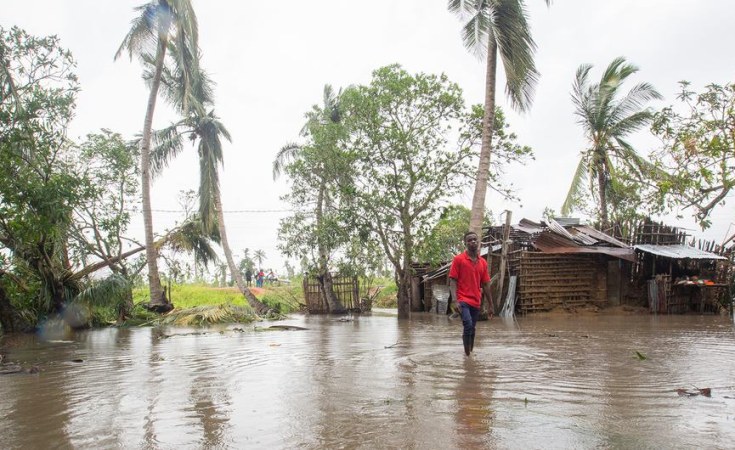Ahead of the first ever EU day for the victims of the global climate crisis, let's remember who's responsible for the worsening situation.
A European Parliament resolution recently designated 15 July as the "EU day for the victims of the global climate crisis". Passed with an overwhelming majority, the initiative is meant to raise awareness about the humanitarian crises and the lives lost due to the effects of climate change.
I would like to take this new commemoration day as an opportunity to remind everyone how wealthy nations and prosperous companies have profited from African resources at the expense of people and planet for decades without being held accountable for their unfair actions. In the Niger delta, oil has been drilled since the 1950s, but people there are among the poorest. Residents eat contaminated fish and cassava, water bodies are grimy with oil which makes farming difficult, and people breathe in chemicals which have caused life-threatening diseases. Fossil fuel projects like these are forced on people in Africa with false promises of economic growth, job creation, and infrastructure development. In truth, the projects benefit only a few rich people and leave the rest to suffer the consequences.
My country, Uganda, faces all of the above problems due to the East African Crude Oil Pipeline (EACOP). If built, the pipeline, a project spearheaded by the French oil and gas company TotalEnergies, would become the longest heated oil pipeline worldwide. TotalEnergies is drilling oil wells in Murchison Falls National Park. EACOP will transport the oil from here to the Indian Ocean from where it will be shipped out into the world. On its way, it will cross some of the most biodiverse regions of Uganda and Tanzania, as well as 178 villages in Uganda and 231 in Tanzania.
People have lost their land and property because of EACOP. They have been displaced into internal displacement camps with unfair compensation - or none at all. To these people, their land represents more than just a physical space. Their land means farms to grow crops, a source of income, cultural heritage, homes for shelter, school for their children. Their land means happiness and love. Right now, these people have no farms to grow food and sell. They have no money to put their children through school. They have no sufficient shelter for their families and no sense of belonging.
The consequences of the pipeline are anything but localised. EACOP is estimated to produce over 34 million tonnes of CO2 emissions which will cause more global warming and hence more climate change. This means more floods, more heat waves, more droughts, more landslides, and more heavy rains for Uganda and Africa as a continent.
Uganda emits less than 1% of global CO2. Africa as a whole emits less than 4% of global CO2 but suffers the brunt of the climate crisis' consequences. Is this fair?
Europe has to take responsibility for its actions in developing countries. Citizens of Europe have to hold their leaders and companies accountable for their unfair actions. Those of you in Europe have to hold your banks accountable for funding projects that are ruining millions of lives and destroying our planet.
Do not leave the burden to climate activists like me but rather work together with us to make the world a better place. It starts with those of you in Austria, Germany, Belgium, the Netherlands, France, and many more European countries. Let's demand that companies like TotalEnergies in France stop engaging in such projects. Let's demand that banks, insurance companies, workers, and more stop participating in such projects.
A memorial day such as the EU day for victims of the global climate crisis is a nice gesture, but solid climate action is much better, and we need that now. The EU is responsible for a lot of disastrous projects that have emitted millions of tonnes of CO2 and exacerbated global warming. The time for promises is over. We need to see action, starting now. Laws and directives like the Corporate Sustainability Due Diligence are a step in the right direction. I am following the debates on the directive and on the EU Green Deal and its targets to reduce greenhouse gases by 55% in 2030 with great interest. On this day, I urge you to always remember that our planet is at stake and the people in the Global South are at the forefront of the climate impacts that the Global North has caused.
I know how difficult it is to be a climate activist in my country, how difficult it is to be on the streets to demand what's right while fearing for my life and for the lives of my loved ones, how difficult it is to speak against projects that cause harm to the people and the planet. That's why, whenever I get the opportunity to talk to people in Europe, I speak freely to let you know that you have a lot of freedom and have to utilise it to fight for what's right. If you are not part of it already, let this day be the day you join the climate justice movement.
Nicholas Omonuk Okoit is a 23-year-old student at Kyambogo University, Uganda, and a climate activist with End Fossil Occupy Uganda, Rise Up Movement, and Fridays For Future MAPA. He first engaged with activism in 2021 after a serious drought in his community dried out crops, left livestock with no grass to graze, and led girls to drop out of school to fetch water.


